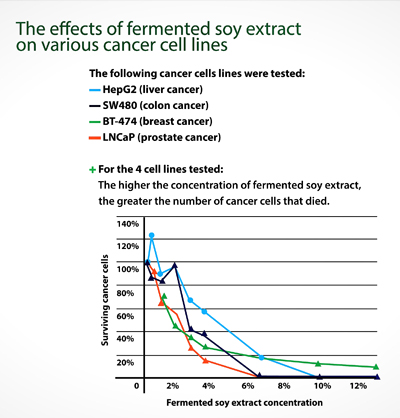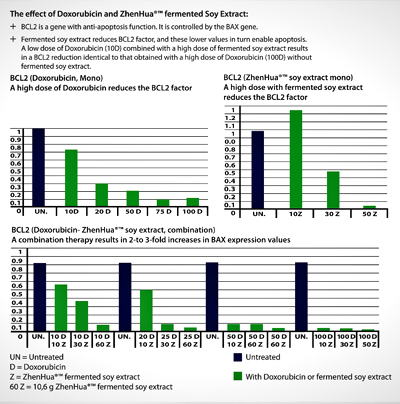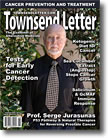Page 1, 2, 3
The Effects of Soy Extract on Various Cell Lines
Tegaran is one of the most effective anticancer agents adapted to various types of cancers including prostate cancer. Tegaran is made from fermented soy that contains phytic acid, protease inhibitors, saponins, phytosterols, and genistein. All in-vitro and in-vivo tests and clinical studies have confirmed the positive effects of the components in the fermented soy extract as therapeutic approaches for adjuvant treatment of solid tumors. Tegaran targets most of the molecular aspects of cancer that include pro-apoptotic genes, inhibitors of apoptosis, transcription factors, MDR1 expression, and immune cell reduction of cachexia; and it increases health status.
Tegaran fermented soy extract increases the efficiency of chemotherapy. At a low dose, doxorubicin (10 D) combined with a high dose of fermented soy extract (100 D) resulted in significant BCL-2 reduction identical to that obtained with a high dose of doxorubicin (100 D) without fermented soya extract. Also, some studies found that soy isoflavones enhance radiosensitivity, induce G2/M cell cycle arrest, inhibit the DNA repair mechanism, boost BAX gene expression, and inhibit BCL-2 and survivin gene expression (Free Radic Biol Med. 2011;51:289-293.

Tegaran increases the activity of natural killer cells (NK cells) in just hours and significantly raises the leucocyte count (WBCs). We know that cancer patients with low natural killer cell activity are at risk of metastases and/or disease recurrence and shorter survival.93,94 Manipulation of the immune system has been a long-term goal of many immunotherapeutic approaches to cancer.
Tegaran plays an important role by inhibiting VEGF and MMPs to prevent tumor growth and new microcapillary vessels.95 There is a particularly high level of MMP7 and MMP9 associated with prostate cancer compounds that correlate with a higher Gleason's score.96,97 Over the past years, we have observed the efficacy and anticancer property of Tegaran with prostate cancer, including advanced stage with high PSA and high Gleason's scores that returned to normal range. Most cases have shown high levels of survivin expression that were lowered the same as PSA with our protocol.
Tegaran has been subject to considerable numbers of tests and clinical studies that are available at www.tegaran.com. Tegaran is manufactured in Switzerland and has FDA registration.
The next important dietary agent we use is curcumin because it acts as a blocking agent in the different stages of cancer and inhibits malignant cell proliferation during promotion and progression of prostate cancer.

Curcumin inhibits NF-kappaB, which interferes with signaling mechanisms such as apoptosis and angiogenesis, by activation of the MMP9 which is downregulated by curcumin.98 In prostate cancer, curcumin has shown the ability to increase the destruction of cancer cells by halting the G2/M phase of the cell cycle.99 Curcumin sensitizes tumor cells to various antineoplastic agents including cisplatin, 5 FU, Taxol, and Taxotere. It also confers radiosensitizing effects in prostate cancer cell line PC 3.100 Curcumin targets the anti-apoptotic proteins such as BCL-2 and survivin, downregulates the P13K/AKT pathway, and increases P53 function, thereby triggering apoptosis and decreasing101 the resistance of cancer cells to chemotherapy/radiation.
Because curcumin is well known to inhibit NF-kappaB upregulation implicated in tumor growth, progression, and drug resistance, curcumin can play a key role in anti-cancer therapy.102 COX2, regulated by NF-kappaB, is a form of cyclooxygenase that catalyzes the rate-limited step in prostaglandin synthesis from arachidonic acid and plays an important role in prostate cancer.103 COX2 is highly expressed in epithelial cells of high-grade prostatic cancer and induces proangiogenic factors such as VEGF104 and the protease enzyme MM9, upregulated in prostate cancer and involved in the angiogenic process.105
Curcumin induces apoptosis and inhibits COX2 and MMP9 by inhibiting NF-kappa B.106
The curcumin utilized in clinical trials, such as at the University of Texas, MD Anderson Cancer Center in Houston, is a liposome curcumin,107 which is better absorbed by the body. We have developed our own formula of liposomal liquid curcumin in 1500 mg sachets with high bioavailability. Our team of pharmacists who specialize in phytotherapy and the researchers at my pharmaceutical laboratory worked in association with the faculty of pharmacy at the University of Lisbon to perform in-vitro tests concerning the bioavailability of this specialized curcumin.
The next product we use for cancer with bone metastases, including breast and prostate cancers, is a liquid cartilage extract (LCE) available in frozen vials. LCE is a concentrated hydrosoluble extract of liquid cartilage that contains biologically active mucopolysaccharides and proteins with strong antiangiogenic properties.108,109 I wrote several articles about LCE that show cases of bone metastases before and after the treatment with the LCE included in our protocol: for example "A Case in Which a Combination of Natural Compounds Was Effective in Metastatic Breast Cancer" (Townsend Letter, April 2011), showing major decrease of bone metastasis and increased bone density in the legs after taking LCE extract. More technical information on the anti-angiogenic and anti-inflammatory property of this LCE110,111 is available in one of my lectures on this subject: "Cutting-edge in oncology for every physician: strategic antiangiogenic treatment: shark cartilage and cancer," 4th European Congress on Anti-Aging Medicine, October 17-19, 2008, Paris, France.
Other interesting bioactive dietary agents that we use in the treatment of prostate cancer include propolis extra (CAPE or Caffeic acid phenolic ester), which is a member of the polyphenolic compounds. Present in high concentration in medicinal plants and propolis, it demonstrates antitumor, anti-inflammatory, anti-angiogenic, immunomodulatory, and anti-proliferative activities.112,113 Most of the dietary agents and medicinal plants induce apoptosis and the destruction of cancer cells. Propolis has a similar effect on prostate cancer,114 inducing growth arrest and suppressing the proliferation of human prostate cancer cell lines.115 Several types of propolis are available, such as red and green propolis from Brazil; but we also use the Portuguese propolis, which has shown major anti-cancer properties.116,117
Portuguese propolis can block specific oncogenic signaling pathways (C-Myc, B-Catenin, Cyclin 1, NF-kappaB) as well as some intermediaries of the P13K/AT pathways, which in turn leads to a decrease in cell proliferation and growth. This can also act by decreasing cancer stem cell populations. Propolis extra enhances the efficacy of chemotherapy in prostate cancer by increasing cytotoxicity, thus increasing cancer cell destruction with less adverse effects.117
Pomegranate juice is also the subject of research associated with prostate cancer. Scientists from the University of California identified components in pomegranate juice that help prevent prostate cancer metastases. It also significantly slowed the rate at which PSA level was rising (PSA doubling time).118-120
Important Food
Diet is of paramount importance to be included in any prostate cancer protocol. A study conducted by Dr. Dean Ornish has shown how a healthy diet alters the expression in genes in a cohort of 93 men (non-smoking) with prostate cancer (PSA 4-10ng/ml) not electing treatment (surgery, radiation, hormone therapy). After three months of the diet, a comparison showed that more than 500 genes had changed, and oncogenes were down-regulated.121
My presentations about the molecular basis of cancer and the targeting of pro-apoptotic and anti-apoptotic proteins using dietary agents and how to detoxify the body may be viewed at http://www.slideshare.net/SheldonStein/presentations, posted by Shel Stein on my behalf. The presentations include "How to understand and treat cancer from a molecular basis," "Protocol for the Treatment of Prostate Cancer," and "Integrative Cancer – New Theories and Advances in Treatment." Also, you may visit my new blog: https://naturopathiconcology.blogspot.com
Page 1, 2, 3
References .pdf
Serge Jurasunas is an internationally well-known practitioner and researcher in complementary oncology and molecular medicine. He is a professor of naturopathic oncology at Pan Am University of Sciences and Natural Medicine, has delivered lectures in over 45 countries including Russia, Asia, and Australia, and was invited to the Congress on Molecular Medicine in Beijing, China, subsequently receiving an invitation to join the advisory board of the Molecular and Cellular Therapies Journal.
Professor Jurasunas specializes in treating all types and grades of cancer in his clinic located in Lisbon, Portugal, having devoted five decades developing innovative therapies and being a pioneer in several approaches to cancer including immunotherapy, stem cell therapy, SJ therapy, live blood analysis and oxidative dried blood testing. His field of interest includes nutrition and iridology.
He spent the past ten years investigating, researching, and putting into clinical application testing of the P53 tumor suppressor gene and reversal of P53 mutation in cancer patients using selective dietary agents. He also works with other molecular markers associated with cancer in follow-up treatments.
He is a frequent Townsend Letter contributor and author of over 150 papers, lectures, and articles translated into 13 languages. His new book, Health and Disease Begin in the Colon, contains full information about these tests and reflects his 50-year professional career.
Please visit my Blog: NaturopathicOncology.blogspot.com
Contact:
www.sergejurasunas.com
Email: Sergejurasunas@hotmail.com
Telephone: 351.912565038
|
![]()
![]()
![]()
![]()







